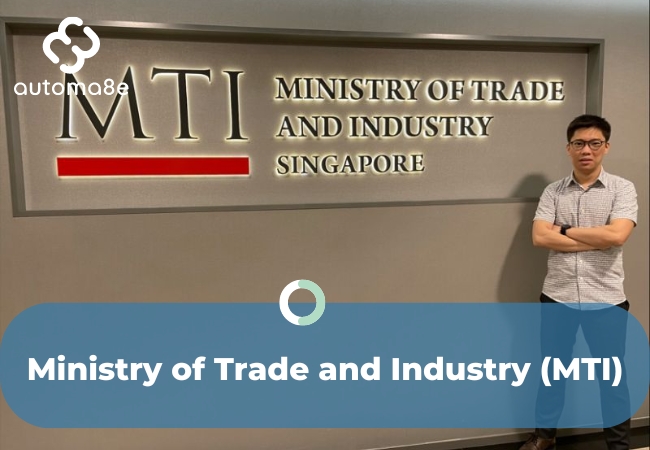In the intricate web of governance that drives Singapore’s economic engine, the Ministry of Trade and Industry (MTI) serves as a linchpin. Established with a vision to propel Singapore’s economic growth and global competitiveness, MTI plays a pivotal role in formulating and implementing policies that shape the nation’s trade, industry, and investment landscape. Join us on a journey as we delve into the core functions and impactful initiatives of MTI, shedding light on its crucial role in steering Singapore’s economic course.
Understanding the Ministry of Trade and Industry (MTI):
The Ministry of Trade and Industry (MTI) stands at the forefront of Singapore’s economic strategy, tasked with charting a path towards sustainable growth, innovation, and resilience. Since its inception, MTI has been instrumental in fostering a conducive environment for businesses to thrive, driving economic diversification, and enhancing Singapore’s competitiveness on the global stage.
Key Functions of MTI:
MTI undertakes a diverse array of functions aimed at catalyzing economic development and fostering a conducive business environment. Here are some key functions of MTI:
Trade Policy Formulation: MTI is responsible for formulating and implementing Singapore’s trade policies, aiming to enhance market access, promote free trade, and safeguard Singapore’s interests in the global arena. Through bilateral and multilateral negotiations, MTI seeks to expand Singapore’s trade networks and secure beneficial trade agreements.
Industry Development: MTI plays a vital role in nurturing vibrant and competitive industries in Singapore. By identifying strategic growth sectors, fostering innovation, and providing targeted support to businesses, MTI aims to enhance the productivity and competitiveness of Singapore’s industries, driving sustainable economic growth.
Investment Promotion: MTI spearheads efforts to attract foreign investments and facilitate the growth of local enterprises. Through initiatives such as the Economic Development Board (EDB), MTI promotes Singapore as a premier investment destination, offering strategic location, world-class infrastructure, and a conducive business environment for companies to thrive.
Economic Planning and Policy Coordination: MTI oversees the formulation of Singapore’s economic policies and strategies, coordinating efforts across various government agencies to ensure coherence and alignment towards common economic objectives. By monitoring economic trends, assessing risks, and implementing policy measures, MTI aims to steer Singapore’s economy towards sustained growth and resilience.
Significance of MTI:
The Ministry of Trade and Industry (MTI) plays a pivotal role in shaping Singapore’s economic landscape, driving growth, innovation, and competitiveness. By formulating forward-looking policies, fostering industry development, and attracting investments, MTI contributes to Singapore’s status as a dynamic and resilient global business hub. As Singapore continues to navigate the challenges and opportunities in the evolving global economy, MTI remains committed to unlocking the nation’s economic potential and creating opportunities for businesses and individuals to thrive.
FAQs: Understanding the Ministry of Trade and Industry (MTI)
The Ministry of Trade and Industry (MTI) is a government agency tasked with driving Singapore’s economic growth and global competitiveness. MTI formulates and implements policies related to trade, industry, and investment, aiming to create a conducive environment for businesses to thrive and contribute to Singapore’s economic development.
MTI undertakes various functions, including trade policy formulation, industry development, investment promotion, and economic planning and policy coordination. These functions are geared towards driving economic growth, fostering innovation, and enhancing Singapore’s competitiveness on the global stage.
MTI promotes investment in Singapore through initiatives such as the Economic Development Board (EDB), which attracts foreign investments and facilitates the growth of local enterprises. By showcasing Singapore’s strengths and offering a conducive business environment, MTI aims to position Singapore as a premier investment destination.
MTI plays a vital role in nurturing vibrant and competitive industries in Singapore. By identifying strategic growth sectors, fostering innovation, and providing targeted support to businesses, MTI aims to enhance the productivity and competitiveness of Singapore’s industries, driving sustainable economic growth.
MTI contributes to Singapore’s economic resilience by formulating forward-looking policies, fostering industry development, and attracting investments. By diversifying Singapore’s economy, enhancing productivity, and promoting innovation, MTI helps Singapore navigate economic challenges and seize opportunities for growth and development.
Conclusion:
The Ministry of Trade and Industry (MTI) stands as a cornerstone of Singapore’s economic strategy, driving growth, innovation, and competitiveness. Through its key functions and impactful initiatives, MTI plays a pivotal role in shaping Singapore’s economic landscape and unlocking the nation’s economic potential. As Singapore continues its journey towards sustainable development and prosperity, MTI remains steadfast in its commitment to fostering a vibrant and resilient economy for the benefit of all Singaporeans.
